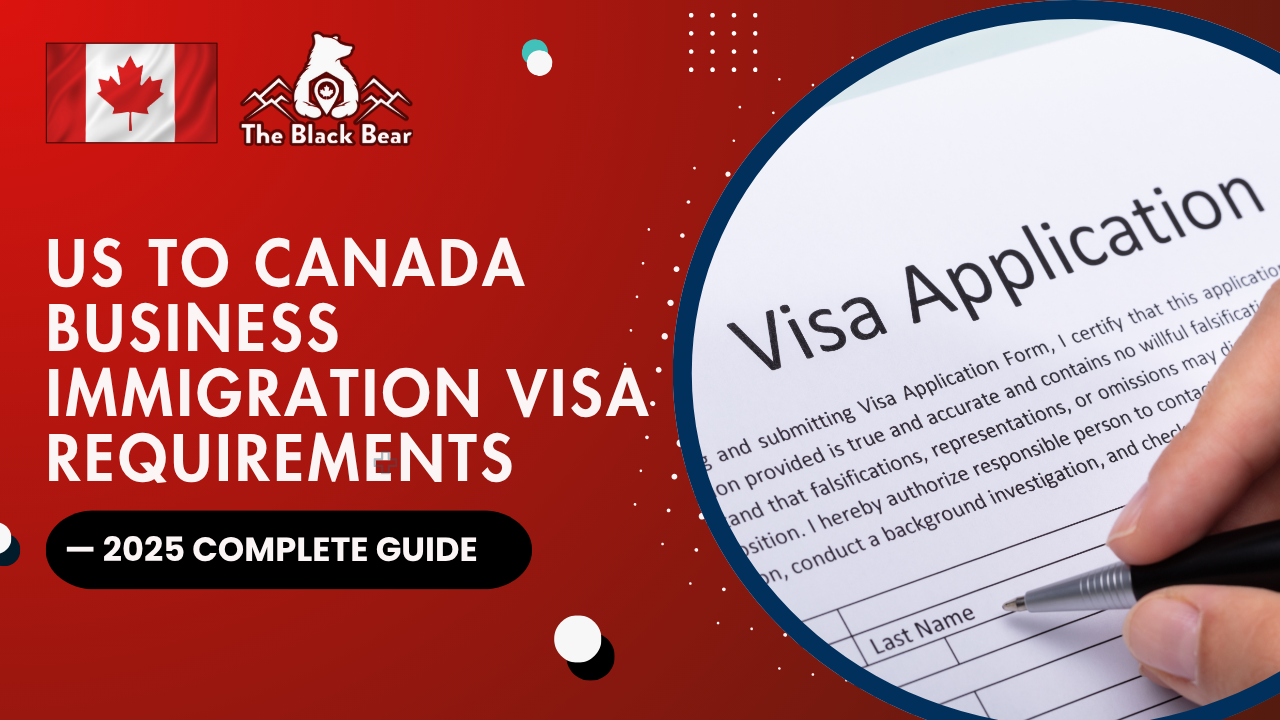Introduction If you’re a U.S. entrepreneur, investor, or company executive aiming to expand your business into a stable, growth-driven market, understanding the US to Canada

Introduction
If you’re a U.S. entrepreneur, investor, or company executive aiming to expand your business into a stable, growth-driven market, understanding the US to Canada business immigration visa requirements is your first step. Canada’s economy, political stability, and pro-business immigration policies make it one of the most attractive destinations for American business owners. The country offers a balanced environment for innovation, skilled labor, and a high standard of living that makes business expansion not only profitable but also sustainable in the long term.
With its robust infrastructure, government-backed innovation programs, and global trade access, Canada has become a launchpad for many successful U.S. entrepreneurs looking to scale internationally. Whether you wish to start a new venture, acquire an existing company, or relocate your existing business branch, understanding the correct pathway is crucial. This guide outlines the essential steps, eligibility criteria, and processes involved — and how Black Bear Canadian Immigration Services (Canada for Immigration) can make your journey smooth, compliant, and successful from start to finish.

Overview: Understanding US to Canada Business Immigration
Business immigration from the U.S. to Canada provides entrepreneurs, investors, and professionals an opportunity to expand operations or create new ventures in a thriving economy. The Canadian government encourages cross-border business growth through clear visa programs and incentives that focus on job creation and economic contribution.
For many U.S. citizens, the transition is smoother because both countries share strong trade relations and similar business ethics, reducing the cultural and regulatory barriers significantly. Entrepreneurs can enter Canada under multiple pathways, including the Start-Up Visa Program, Provincial Nominee Programs (PNPs), and Intra-Company Transfer (ICT) options. These programs cater to both start-ups and established corporations aiming to expand their footprint in Canada.
Moreover, trade agreements like CUSMA (formerly NAFTA) streamline temporary work permits for U.S. executives and professionals, making business expansion into Canada faster and easier than most other regions globally.
At Black Bear Canadian Immigration Services (Canada for Immigration), our experts help U.S. business owners identify the ideal immigration stream, design compliant business plans, and handle the entire visa submission process seamlessly.
Core US to Canada Business Immigration Visa Requirements
To qualify under most US to Canada business immigration visa requirements, applicants must meet a mix of financial, professional, and operational conditions. These requirements ensure that only capable and committed entrepreneurs contribute to Canada’s economic development.
1. Business Ownership and Experience
Applicants must demonstrate experience in owning, managing, or directing a successful business in the U.S. This can include previous business ventures, executive management roles, or senior decision-making positions. The Canadian authorities value consistent leadership experience and a proven track record in driving profitability and innovation. Your background helps establish credibility and showcases your potential to replicate similar success in Canada.
2. Net Worth and Investment Capacity
Each business immigration stream in Canada has its own financial criteria. On average, applicants should have a net worth between CAD 400,000 and CAD 800,000. Investment amounts usually range from CAD 150,000 to CAD 600,000, depending on the province or program. For example, Ontario and British Columbia often require higher investments, while Atlantic provinces may have lower thresholds to attract investors. Applicants must provide verifiable documents — such as bank statements, investment records, and tax filings — to prove their financial capacity.
3. Viable Business Plan
A solid business plan is the heart of your application. It must clearly define your business objectives, target market, competitive advantage, and projected financials. The plan should demonstrate how your business will generate employment and benefit the local economy. Immigration officers often evaluate the innovation, sustainability, and long-term feasibility of your proposal. A professionally written plan tailored to Canadian market realities significantly improves approval chances.
4. Language Proficiency
While not as demanding as skilled worker immigration, most business visa applicants must prove language proficiency in either English or French at CLB Level 5 or higher. Language fluency ensures that entrepreneurs can effectively communicate, manage staff, and navigate business operations within Canada. Strong communication also helps build trust with Canadian clients and local partners.
5. Active Management
You must play an active role in managing the business operations once in Canada. Passive investment — such as simply buying shares — typically does not qualify. Authorities expect entrepreneurs to be directly involved in decision-making, marketing, and day-to-day activities. This requirement highlights the government’s intention to attract genuine entrepreneurs rather than silent investors.
6. Economic Benefit
Lastly, your proposed business must create measurable benefits for Canada — such as local employment, technology transfer, regional development, or community support. The greater your project’s potential economic impact, the stronger your case for approval.

Main Immigration Pathways from the U.S. to Canada
1. Start-Up Visa Program (SUV)
The Start-Up Visa Program targets innovative entrepreneurs with high-potential ideas. It allows American business owners to establish and operate cutting-edge ventures in Canada. To qualify, applicants must secure a Letter of Support from a designated organization (such as a venture capital fund, angel investor, or business incubator). The government values creativity, scalability, and innovation — making this ideal for tech startups and R&D-driven enterprises.
Applicants must also meet settlement fund and language requirements. Once approved, they receive permanent residency, offering a pathway for both the entrepreneur and their family to settle permanently in Canada.
2. Provincial Nominee Programs (PNPs) – Entrepreneur Streams
Every province and territory runs its own entrepreneur or investor stream under the PNP system. These programs allow U.S. citizens to invest in a business or start a new venture in a specific region. The process usually starts with an Expression of Interest (EOI), followed by a business performance agreement with the province.
PNPs often require a minimum investment between CAD 200,000 and CAD 600,000 and creation of at least one full-time job for a Canadian citizen or permanent resident. In return, provinces offer faster processing times and localized business support services, making it a strong choice for regional development.
3. Intra-Company Transfer (ICT)
If you already operate a business in the U.S., the Intra-Company Transfer (ICT) route lets you establish a Canadian branch or subsidiary. It’s ideal for expanding your brand across borders. Eligible applicants must have worked for the U.S. entity for at least one year in a senior or executive position. The Canadian branch must maintain a qualifying relationship with the parent company (parent, subsidiary, or affiliate). This option offers a temporary work permit, renewable until the applicant transitions to permanent residence.
4. Self-Employed Persons Program
This niche program caters to self-employed professionals, particularly in cultural or athletic fields. If you have experience in areas like film, design, music, or sports and can contribute meaningfully to Canada’s cultural economy, this could be a viable route. It’s less common for general entrepreneurs but still valuable for creative professionals.
5. Owner-Operator LMIA and Work Permit
Through the Owner-Operator LMIA pathway, a U.S. citizen can purchase or start a business in Canada and apply for a work permit under a Labour Market Impact Assessment (LMIA). After operating successfully and meeting job-creation targets, applicants can apply for permanent residence through the Express Entry or PNP route.
Processing Time, Costs, and Statistics
| Program | Processing Time (2025) | Investment Range | Success Rate |
|---|---|---|---|
| Start-Up Visa | 12–18 months | None fixed (depends on investor) | 75% |
| PNP Entrepreneur | 15–24 months | CAD 200K–600K | 68% |
| Intra-Company Transfer | 3–6 months (work permit) | N/A | 82% |
| Owner-Operator LMIA | 6–9 months | CAD 150K+ | 71% |
Average settlement funds required: CAD 13,000–18,000 (single applicant)
The time frame can vary depending on your chosen province, completeness of documents, and program updates. Having professional representation can reduce delays and errors, improving approval odds.
Looking to start your business journey in Canada? Contact Black Bear Canadian Immigration Services today — your trusted partner in navigating every step of the US to Canada business immigration visa process.

Common Challenges and How to Avoid Them
Business immigration is a complex process, and many applications are delayed or rejected due to preventable mistakes. One major pitfall is submitting a weak or generic business plan that doesn’t reflect the Canadian market’s realities. Immigration officers prioritize applicants who show genuine understanding of their target region and industry.
Another issue arises from insufficient liquidity or unclear proof of funds. You should maintain verifiable assets and ready-to-invest capital to demonstrate commitment. Also, ensure that your role is active management, not passive ownership. Entrepreneurs must stay involved in the day-to-day operation of their enterprise.
Finally, stay updated with policy changes and evolving program criteria. Working with a licensed consultant helps ensure compliance and increases your application’s success rate.
How Black Bear Canadian Immigration Services (Canada for Immigration) Helps
Black Bear Canadian Immigration Services (Canada for Immigration) has extensive experience helping U.S. entrepreneurs, investors, and corporate leaders successfully immigrate to Canada through business visa programs. Our mission is to make your process smooth, fast, and transparent.
Our team provides end-to-end support — from eligibility evaluation and program matching to business plan development and document preparation. We also assist in coordinating with designated organizations, provincial offices, and Canadian government bodies.
Once your business is operational, we offer post-landing support, including incorporation assistance, compliance guidance, and employee hiring strategies. This holistic approach ensures that your transition from U.S. to Canadian business ownership is seamless.
Ready to expand your U.S. business to Canada? Reach out to Canada for Immigration (Black Bear Canadian Immigration Services) — your one-stop partner for a smooth, successful transition.
Tips for a Strong Business Immigration Application
- Choose a province aligned with your business industry. For instance, Ontario is best for tech, while Alberta is strong in oil and logistics.
- Hire a licensed consultant to avoid documentation or legal errors.
- Maintain audited financial records and ownership proofs from your U.S. company.
- Demonstrate active management through operational plans, hiring projections, and expansion strategies.
- Stay informed about program updates, as criteria for investment and net worth often change annually.
Conclusion
Transitioning your business from the U.S. to Canada offers unmatched opportunities in one of the world’s most stable economies. Understanding the US to Canada business immigration visa requirements allows entrepreneurs to plan strategically, comply with all conditions, and maximize their success potential.
With the guidance of Black Bear Canadian Immigration Services (Canada for Immigration), you don’t have to navigate the complex process alone. From planning your investment strategy to securing work permits and permanent residence, we’re here to simplify each step with precision and professionalism.



